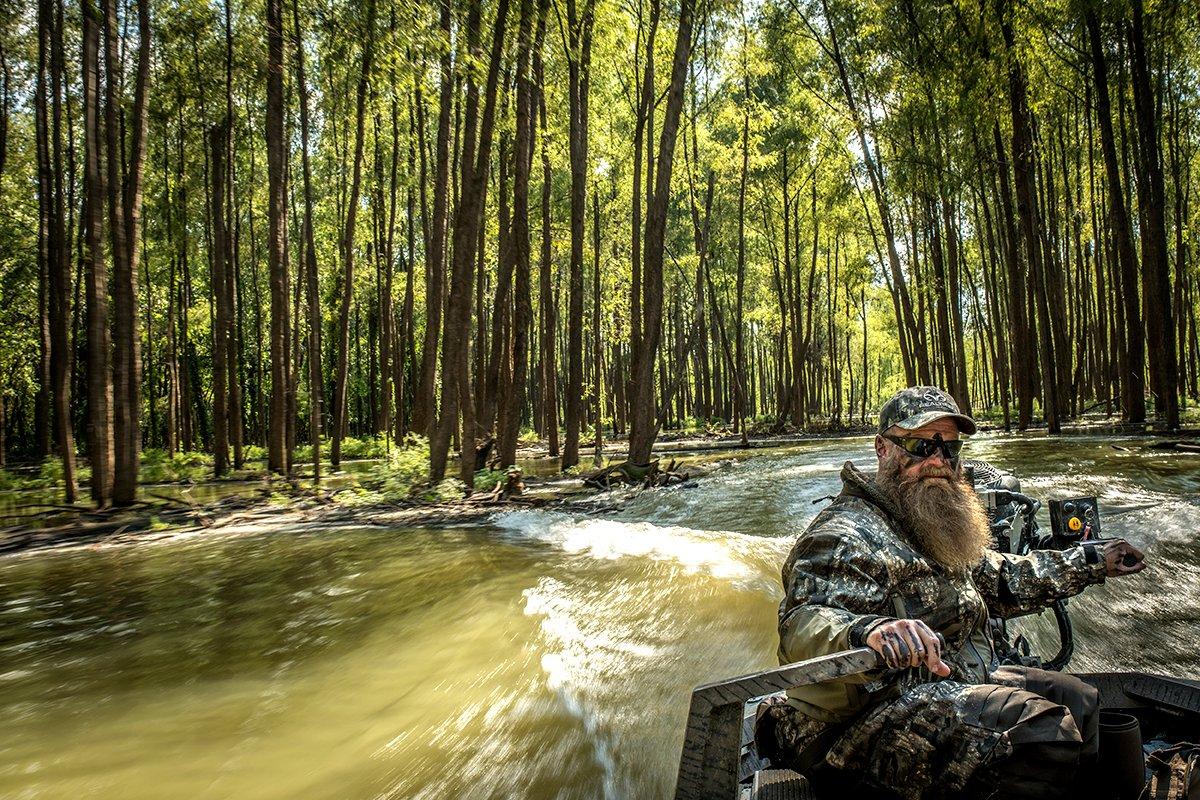Some look to their outboard or mud motor as a critical tool for waterfowling. But is the noise it makes counterproductive?
You're probably old-school if you don't run a mud motor in shallow water or a big outboard on open water nowadays. The appeal is obvious: Such motors are efficient and effective, and they carry a significant cool factor. Further, motors let you go farther and faster while staying safe.
Yet some folks maintain that in a few situations, boat motors might actually hamper your efforts, spooking birds out of an area before a hunt begins. Who's correct? Is it better to go with motorized horsepower or travel quietly with paddle power? After many hunts with and without motors through the years, here's my unsolicited opinion.
First, to answer the trick question, yes, motors spook ducks. Obviously, running full-throttle through a small wood duck roost or even Pool 9 of the Mississippi River in the dark will flush uncountable numbers of birds and put them on edge. And even the distant approach of an outboard on big water will put a raft of ducks in the air, forcing them to relocate.
On the flip side, let's admit that mud motors or outboards are absolutely necessary in many waterfowling situations, including long rides, deep water, big water or rough conditions. You cannot be sufficiently mobile and safe plying any large lake, river or impoundment without horsepower behind you.
Basically, the question boils down to specific situations. When you're hunting destination areas or essentially trafficking birds — as on big rivers, open water or even timber holes in large WPAs — you won't create problems by motoring to and from your hunting area. Birds will be sufficiently far away before light, after hours and during midday lulls that you won't stir them up.
But when you'll be fairly close to ducks you plan to hunt — small lakes, mill ponds or other areas where ducks might roost nearby — you're often better using a quiet approach that creates minimal disturbance, whether it's a skiff, canoe, kayak or by walking.
I'm reminded of this every season when hunting small waters early in fall. During many openers, guys run motors for what seems like hours while trying to wedge their boats into cattails or atop bogs. Meanwhile, wood ducks and mallards scatter for points unknown in the dark. Sure, some return or pass through, but it's obvious the loud disturbance scatters birds and makes them that much warier before shooting even begins. In the same areas later in the season, I'll often slip in close before light in relative silence with a skiff or canoe. Of course, many ducks still leave at shooting hours, but enough usually remain and mill about to provide good gunning early in the morning.
Sometimes, a hybrid approach seems to work best. When hunting big-water divers, I'll often motor to within a reasonable distance of where we expect ducks have spent the night but try not to get so close that the birds flush before daylight. That way, we can hopefully decoy small groups traveling to and from roosting and feeding areas. And when hunting smaller holes off larger water — a remote timber hole next to a large river or shallow bay on a big slough — it seems best to motor close to the area but then slip in via a smaller craft or on foot to avoid undue disturbance. That approach can be especially critical when scouting for birds, as you want to avoid startling or flushing them — thereby destroying any sense of safety they felt — before you plan to hunt.
Bottom line: Think before you turn the key. If the situation requires you to run a motor, the answer is easy. But if you think a sneaky, somewhat silent approach to the X could put you in better position, consider that. Modern outboards and mud motors are fantastic tools, and I couldn't live without mine. But if I have any worry that the disturbance they create might hinder a hunt, I'll grab a push pole or prepare for a long walk, knowing the extra effort could pay off.
Click here for more Realtree waterfowl hunting content. And check us out on Facebook.









